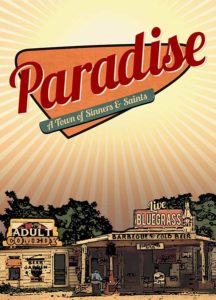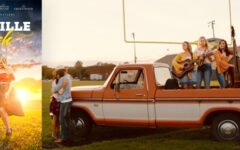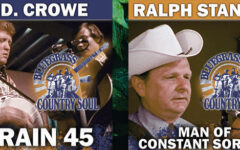
Bluegrass lovers have known for years just how powerful film and television can be in getting the music in front of millions of people. From Foggy Mountain Breakdown in the Bonnie and Clyde movie in 1967, through Duelin’ Banjos in Deliverance in 1972, up to Man of Constant Sorrow in the O Brother, Where Art Thou film, both bluegrass performers and fans have see the profile of the music rise in popular appreciation. Likewise with television programs like The Andy Griffith Show, The Beverly Hillbillies, and Petticoat Junction in the ’60s.
Western Europe saw a similar bump when the Belgian film Broken Circle Breakdown was released in 2014.
Now we have learned about a newly-completed bluegrass musical that is slated for release in 2023 called Paradise, A Town of Sinners and Saints. It contains 19 new songs, almost all performed in a bluegrass style, with the band intimately integrated into the cast of performers.
The film project grew out of a stage play by the same name, written by Cliff Wagner, Tom Sage, and Bill Robertson. Wagner is the music guy, and Sage and Robertson are former writers for National Lampoon. It’s a musical comedy with some elements of the cornball humor from the old Hee-Haw show.
On stage, it is set in a small town called Paradise, meant to be in eastern Kentucky, though that is never stated, with the townspeople trying to figure out how they might save their community and bring some life back into Paradise. Members of a bluegrass band were on stage with the cast, making the integration of the many songs into the storyline that much more seamless.
Whenever the creative team have staged it live, the response has been quite powerfully positive, but given the high cost of putting on a musical theater production, especially on the road, they have come up with the idea of making Paradise into a movie, in order to help promote the play.
That’s not as crazy as it sounds, according to Cliff Wagner, who wrote all of the music and much of the lyrics for the show.
“It’s really difficult to get a musical out there. Every time you put it on at a theater, it’s very expensive. Bill came up with the idea to make a movie in order to help promote the play. There’s a musical called Once, sort of based on Irish music, that did the same thing. They made a film and then ended up opening on Broadway with worldwide distribution.”
The film version of Paradise, A Town of Sinners and Saints has been completed, and had its first screening last week at the Charlie Chaplin Theater in Los Angeles to great acclaim.
But let’s back up a bit and find out a little more about Cliff Wagner, a legit bluegrass guy who has played music all over the US.
“I grew up with bluegrass in Greenwood, MI, and started playing banjo when I was 11. As a teen I was performing with BF Mims & The Delta Bluegrass. BF had grown up in a cabin with 13 siblings, and he taught me all about the music – Monroe, Jimmy Martin, Stanley Brother – all of its. By the time I left home I had the whole catalog learned. I went to Berklee in Boston, and I did play guitar, but at that time they didn’t do bluegrass at all. I learned a lot musically, which I still use today. I didn’t graduate – the final year was intense – but when I left I could read, had some theory down, and understood what music was about.
I played around some around Boston on banjo, guitar, fiddle, or dobro. Then I moved to New York and then to LA, and am now back in Boston.”
It was in Los Angeles that Cliff made his biggest mark in bluegrass, leading a popular group called Cliff Wagner & The Old No 7. They played a traditional bluegrass style but with original material, and they had a brush with fame in 2007 on a Fox TV competition program.
“Cliff Wagner & The Old No 7 was my last group in California. We performed on an ill-fated reality show called The Next Great American Band, and stayed on there for seven weeks. It was produced by the same people that did American Idol and So You Think You Can Dance, but the network wasn’t really behind it. It wasn’t renewed for a second season, but having gone through that whole process really helped when we were writing the musical.”
Wagner tells us that the initial idea for Paradise was his, but that he couldn’t have done it without his co-writers.
“Tom and Bill have been friends for years. When I lived in LA, I went to Tom one day and said, ‘I’m tired of just going out and playing gigs. I want to put together a show – a variety show, with some music, some skits, maybe have some guests.’ So Tom and I started writing some things, and as we were working, he said, ‘This would be better if there was a story,’ and half way through it we realized, ‘I think we’re writing a musical.’
None of us had ever written something like this – we just took a swing at it. I had been doing some music directing at a theater, and I showed the director the finished script, and he loved it. We did the live show for the first time there.”
Of course there had to be some changes to the basic script and setting going from stage to screen.
“The way we did it on stage was to have the band on stage with the performers… they were part of the town. We used a different approach in the film with choreography, singing, backup singing, and all that. So we recorded the music first.
I have a band here in Boston that I play with, so we could save some money if I just recorded all the music in Boston with scratch vocals. We finished recording at the Boom Room (Kevin Jarvis’ place) in about two weeks while they were rehearsing for filming in LA. We got a soundstage, and actually used the set we had been using for the live performances and one additional one we built.
The film opens up in a coal mining town called Paradise. We never say it’s in Kentucky, but it might be. The coal mine has dried up, everyone is leaving town, and they are trying to figure out how to save the town. Then a preacher comes to town and says he has an idea for the town to participate in a reality TV show to find the most downtrodden, beat-down hillbilly town in America. The show is called Boom To Bust.
In the beginning of the second act they perform the show’s theme song. The final premise is that actually everyone in this town all sing and play music, and that eventually is what saves them.”
As a bluegrass guy, Cliff says that he didn’t want to have the music be similar to a standard musical.
“The music is not what is typically written in a musical. I wrote songs that are songs – they have verses and choruses that relate to what’s happening in the scene. The story is told through both the song lyrics and the spoken dialogue. Every time we have done the show live, we see people coming out of the theater singing the songs.”
So the obvious question is, “how did they raise the money for a feature length film?”
“Tom and Bill, with our producer Brad Wilson, basically found all the money to fund the film production. I had moved to Boston and we had just done a live show in Austin, when Bill called and told me, ‘We’re going to do a movie.’ They started with a GoFundMe page, and from that they found several people who wanted to back the project.
Justin Ward, our director, knew exactly what to do with each shot. He had the whole movie in his mind.
We filmed the whole thing in six days. Only two actors in the movie had been in the play. Everyone else hadn’t seen it before. But we put it together in less than a year, with two or three cameras the whole time.”
What’s next for the producers and writers?
“We have applied to some film festivals, and are talking to distributors. The screening last week was primarily for the investors, cast and crew, and a few others. It was the first time we had seen the finished product. There are so many ways to distribute a film now, so we are very hopeful.
The final edit is just under 120 minutes. There are some very traditional sounding songs, and some that are less so. But the entire score was played with bluegrass instruments, plus drums. It all falls pretty much into the bluegrass and old country realm. There’s one song that the preacher sings that is more of an uptempo gospel feel.”
Best of luck to Paradise, A Town of Sinners and Saints, and everyone involved in the production. There is a web site and social media pages for the film where you can keep up with screenings around the country. Let’s hope this project is successful, both in movie houses and live on stage!








